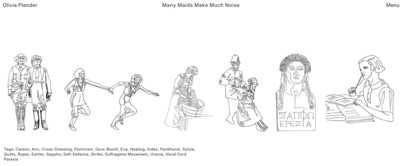Seminar with Olivia Plender
Reckitt, Helena. 2019. 'Seminar with Olivia Plender'. In: PhD Seminar with Olivia Plender. Tensta Konsthall, Stockholm, Sweden 27 May 2019. [Conference or Workshop Item]
![[img]](https://research.gold.ac.uk/33366/1.hassmallThumbnailVersion/Olivia%20Plender_Many%20Maids%20Make%20Much%20Noise.png)
|
Image
Olivia Plender_Many Maids Make Much Noise.png - Other Download (963kB) | Preview |
Abstract or Description
As part of Olivia Plender’s PhD at Kungl. Konsthögskolan/Royal Institute of Art in Stockholm, Helena Reckitt joined her as an opponent for a public event at Tensta Konsthall. She responded to Plender’s video and sound piece 'Many Maids Make Much Noise' (2019) and her semi-permanent installation at Tensta Konsthall.
In her talk Reckitt reflected on how Plender’s work opens up questions about how to activate the practices developed within earlier social movements so that they can be tools of learning and consciousness raising in the present.
She suggested that Plender’s work is concerned less with the representation of feminist and other struggles than with how to instigate contemporary collaborations on the basis of archival material. Earlier moments and movements thus act as triggers for discussion and action. Revealing similarities and differences in time, place, and context, Plender's art sheds light on how certain ideologies and tropes, such as that of the ‘deserving poor’ within the context of the welfare state, return. It also shows how tools such as consciousness raising, developed during earlier periods of collectivity, are being used within current anti-austerity movements. Social reproduction feminism, developed by feminists in the 1970s, is another rich body of theory and practice that informs contemporary responses to care work and emotional labour, trading skills and tasks, and actions such as rent strikes.
Plender’s research into the suffrage movement contributes to the transmission of feminist legacies and lineages. It counters the current sense that feminism began in the late 1960s, providing a richer historical narrative.
Other aspects of Plender’s work that Reckitt highlighted include the importance of women’s voices, their texture and timbre, and how Plender chooses not to depict her subjects visually, due to their need for anonymity.
She asked Plender to speak more about the role of self-defence in feminist struggle, as well as sexual abstinence.
Reckitt also raised the critique that artists are seen to instrumentalise the energy and cultural capital of social movements and protest without engaging on a deep level, or pulling their weight as activists. To these criticisms she presented the counter view, suggesting some of the roles that art can play in social movements: from devising aesthetic tools to make struggle visible and public, to offering imaginative tools with which to envision the world differently, and stimulating tools for potential reactivation.
She concluded by asking Plender if working on the research had given her insights into the frustration - alongside the joy - that can accompany work in social movements, from the challenge of sustaining momentum and building consensus, to the disappointment and burn-out when so much of this work is rejected and suppressed.
|
Item Type: |
Conference or Workshop Item (Talk) |
||||||
| Departments, Centres and Research Units: |
|||||||
| Dates: |
|
||||||
| Event Location: |
Tensta Konsthall, Stockholm, Sweden |
||||||
| Date range: |
27 May 2019 |
||||||
| Item ID: |
33366 |
||||||
| Date Deposited: |
14 Apr 2023 09:10 |
||||||
| Last Modified: |
14 Apr 2023 09:10 |
||||||
|
URI: |
View statistics for this item...
 |
Edit Record (login required) |

 Tools
Tools Tools
Tools
